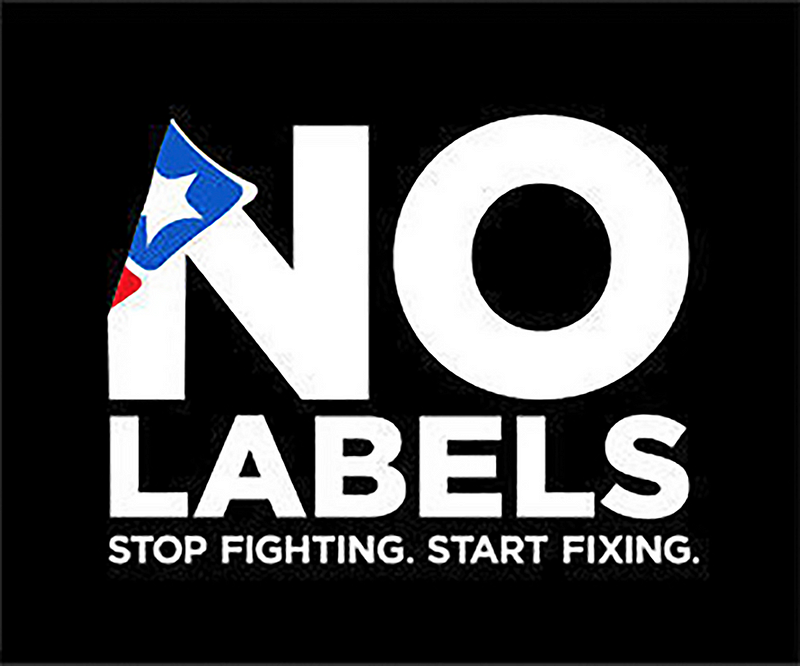
No Labels was confirmed as an official club at the Student Assembly Organization Recognition Committee last week. While you might have seen some posts in class Facebook groups about the club looking for E-board members, you might not be entirely sure what they stand for and the threat they pose to the idea of bipartisanship.
Founded in 2010, No Labels is a 501(c)(4) that “is a movement for the tens of millions of Americans who are fed up with the dysfunction and will no longer put up with a government that does not represent the interests of most Americans,” according to their website. While the club will not receive funds from their national organization, like College Democrats and College Republicans do, it will promote discussion of their values and ideals, which, at first glance, seems like a reasonable way of addressing our country’s current polarization.
No Labels claims to be a bipartisan organization that is looking to work across the aisle to actually implement change in this country. In theory, this a noble goal that many people have tried to accomplish, but like everything in politics, it might not be as it seems.
According to
The Intercept
, the group has taken in a significant amount of money from conservative-leaning groups in 2018, such as Louis Bacon — founder of Moore Capital Management hedge fund — who gave $1.1 million to the GOP in 2016 and $1 million to No Labels-affiliated Super PACS; James Murdoch (the son of Rupert Murdoch — owner of News Corporation, which includes
The Wall Street Journal
and
Fox News
) who gave $500,000; and Nelson Peltz who gave $900,000 to affiliated PACs and candidates.
In the past, they’ve also taken money from Christy Ruth Walton, a Walmart heiress; Josh Bekenstein, CEO of Bain Capital; John Catsimatidis, CEO of Gristedes Foods; and Carl Ferenbach, co-founder of Berkshire Partners LLC.
These are the people behind No Labels. Their interests are only in making more money for their companies and stockholders. They have no interest in bipartisanship; they want to push the Democratic Party to the right so that it becomes, in essence, a GOP-lite.
No Labels funneled money to center-leaning Democrats not only in the lead-up to November elections, but during the primary season as well. In Illinois’ 3rd Congressional District, Rep. Dan Lipinski, one of the most outspoken anti-abortion members of the Democratic caucus, barely fended off his challenger, Marie Newman, who had the endorsements of Planned Parenthood, NARAL Pro-Choice American, and EMILY’S List. After the 51 percent to 49 percent result in favor of Lipinski, it became apparent that he had won his primarily because of the $1 million brought in by No Labels and its affiliated PACs.
According to
Think Progress
, No Labels spent $2.5 million to help protect a handful of vulnerable GOP incumbents, like Brian Fitzpatrick (R-PA,) who narrowly won his race and received $600,000 from the group. On the other side of the aisle, the group only spent $1.25 million on vulnerable Democrats.
The Problem Solvers Caucus in Congress, which developed from informal meetings organized by No Labels, is claims to be equally made up of Democrats and Republicans. Led by Rep. Josh Gottheimer (D-NJ), the group’s Democrats said they would not vote for Nancy Pelosi as House Speaker unless she agreed to their parliamentary reforms.The reforms made it easier for the now Republican minority to get their legislation brought to the House floor and voted upon. The caucus said it would weaken the power of congressional leaders and extremists on both sides, but in reality it only significantly affected the influence of progressive members.
The Problem Solvers did not try to get these reforms passed under John Boehner’s or Paul Ryan’s tenures as Speaker of the House, where they had a similar amount of power compared to the 116th Congress. Why? Because the donors and leaders of No Labels were worried that Pelosi would be too progressive for their liking. Pelosi eventually caved in to their demands, which will ensure a right-leaning tilt to this Congress even though the House of Representatives is controlled by a Democratic majority.
More and more of America is starting to support proposals for universal healthcare and the Green New Deal from politicians like Senator Bernie Sanders (I-VT) and Rep. Alexandria Ocasio-Cortez (D-NY.) No Labels has managed to hijack the Democratic Party to ensure their donors’ business interests are protected from the will of a majority of Americans.
No Labels is concerned about not conforming their group to a binary identity, but let’s be honest: it’s really made up of conservative donors and has conservative interests. Just because you have Democrats and Republicans doesn’t mean your legislation or group is bipartisan. In fact, No Labels and the Problem Solvers Caucus can talk the talk, but they don’t have any major legislative accomplishments. According to
The Washington Post
, the only other significant piece of legislation from the caucus passed was an opioid epidemic package sponsored by Rep. John Katko’s (R-NY.)
“Their track record is nonexistent,” said Rep. Raúl M. Grijalva (D-AZ) to
The
Washington
Post
. “It’s more of a political cover operation than real legislative operation — there’s no policy product.”
To categorize No Labels as moderate or bipartisan would just be plain wrong. The group is only strengthening a conservative, pro-business infrastructure that actually has no accomplishments besides raising millions of dollars. In many ways, they’re not that different than what would come out of a Republican group, but at least those groups have the backbone to call themselves conservative.
While I doubt the people founding the No Labels club at Hamilton have bad intentions, you should be aware of what the national chapter stands for before you join it, because you will be representing their values.

















